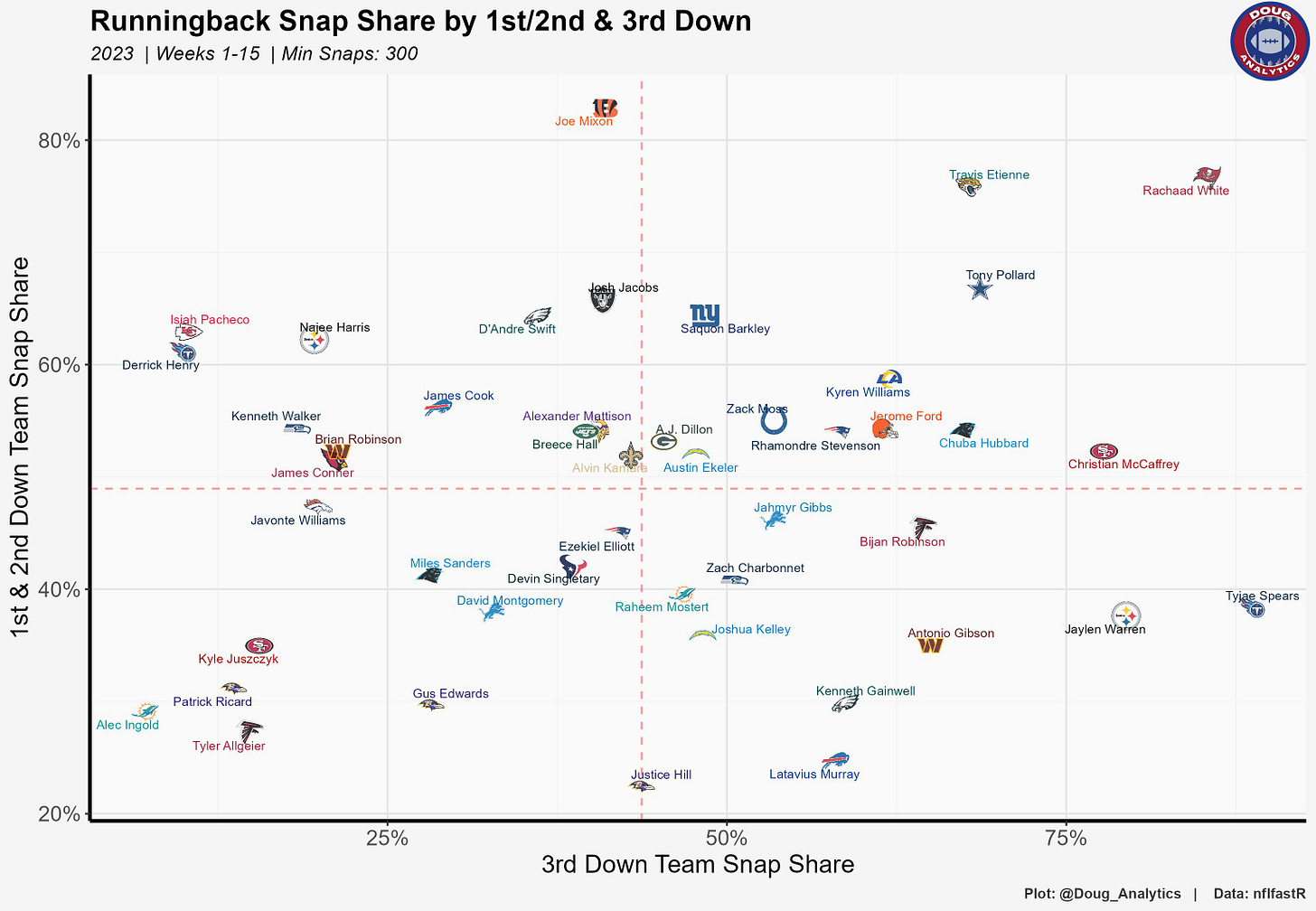In defense of Charbonnet
Seahawks challenge "running backs don't matter" by drafting good second round running backs, or do they? Seaside Joe 1754
The argument that running backs don’t matter was weaponized with statistics. Not film study or coaching anecdotes, but from your classics (rushing yards) to the new wave abstract (expected points added per run on perfectly blocked plays vs. non-perfectly blocked), stats are the samurai sword being weilded by those who argue that teams shouldn’t draft running backs in the first round second round day two ever.
(Sorry, the goal posts keep getting moved back.)
When I started to research this article, I expected to find that Ken Walker III was having a more exceptional season than Zach Charbonnet. Walker powered the Seahawks to a win over the Eagles on Monday, gaining a season-high six first down runs and scoring a desperately-needed 23-yard touchdown that gave Seattle what they needed most of all…
Avoiding any red zone plays.
The Seahawks are now 6-1 when Walker gets more than 12 rushing attempts and these were games in which the team needed him to keep the score close or maintain a tiny lead, not blowouts that afforded him opportunities to pad his stats.
But there is one thing that keeps me from going all-in on the argument that Ken Walker is having a better season than Zach Charbonnet. The stats.
In Wednesday’s Seaside Joe on the 2023 draft class, I was surprised to see some pushback in the comments on the premise that either Charbonnet has justified his second round selection, or at worst, not done anything to make Seattle regret that decision. I’m not saying that there’s anything wrong with pushback—such comments are encouraged!—or that I was right.
I could be wrong. Which is why I decided to dig a little deeper, expecting to see that I had been too kind to Charbonnet. If anything, I wasn’t complimentary enough.
Zach Charbonnet: Draft Bust or Draft Steal? The answer isn’t written, but the ‘running backs don’t matter’ myth won’t die
Let’s talk about Charbonnet and bust some of the myths that the Seahawks could have done just as well by drafting “the same running back” several rounds later…
Zach Charbonnet’s rookie season
Raw Stats:
Ken Walker: 176 carries, 720 yards, 7 TD, 4.1 YPC, 47.7% success rate, 24 rec, 232 yards, 1 TD, 0 fumbles
Zach Charbonnet: 99 carries, 428 yards, 1 TD, 4.3 YPC, 47.5% success rate, 25 rec, 146 yards, 0 TD, 0 fumbles
They don’t have exactly the same offensive line or exactly the same surroundings, or exactly the same schedule faced, but it’s as close as comparisons can hope for and we see not much difference here. I mean, we take away the touchdowns, which is heavily predicated on getting goal line carries, and the stats are essentially the same.
Walker has four 1-yard touchdown runs this season. Charbonnet has one touchdown total and it came from the 1. So, is it fair to assume that Charbonnet could have scored goal line touchdowns if Walker didn’t exist?
I’m okay with that assumption. Walker has 19 rushing attempts inside the 10, Charbonnet has 11.
Support Seaside Joe’s daily Seahawks newsletter by upgrading to Regular Joes. Now is the time to take advantage of a special offer if you haven’t signed up yet:
Zach Charbonnet is the third/fourth down back
What’s obvious is that the Seahawks prefer having Charbonnet on the field on third downs, with Walker getting the nod on first and second down. Despite the playing time disparity, Charbonnet and Walker both have eight third down rushing attempts, while Charbonnet has been preferred on fourth downs.
This chart by Doug Analytics on Twitter shows a 50% snap share on third down for Charbonnet, compared to about 20% for Walker:
Third down being as important as it is, it is CLEAR that the Seahawks drafted Charbonnet with the feeling in mind that Walker needed a complementary teammate in the room who could replace him on third down and that DeeJay Dallas was not it.
Has it worked?
The stats don’t support that either: The Seahawks converted 37.8% of third downs in 2022, but that has dropped to 34.1% in 2023, which ranks 27th in the NFL.
That’s not Charbonnet’s responsibility, I’m just saying that Seattle’s effort to convert more third downs—which has a lot to do with the offense getting to third-and-short or manageable as opposed to third-and-long—this season hasn’t worked. What they do feel works is having Charbonnet as Walker’s handcuff instead of Dallas (who was worthless on third down) and Travis Homer (who had just one third down carry all of last season).
Why are teams allowed to draft specialized players at other positions like wide receiver and cornerback, but not allowed to draft specialized players at running back?
The highly-praised Buffalo Bills drafted James Cook in the second round in 2022, right after Seattle picked Walker, as a complementary option to a more “traditional” running back. Now Cook and teammate Latavius Murray are two of the most successful players at their position in 2023 and the Bills are “America’s offense”.
Yet when the Seahawks do it, it’s because “Pete Carroll was the first settler west of the Mississippi.”
“Yeah, but Joe, the Bills signed Latavius Murray! We’re just saying, you don’t need to draft a running back to get that type of production.”
It’s not for lack of trying. Buffalo drafted Cook right after the Seahawks picked Walker. And they drafted third round running backs in back-to-back years with Devin Singletary and Zack Moss, both of whom are having good seasons with other teams now, by the way.
We all know by now that the days of Walter Payton—who had 10 seasons with 300+ carries—are over. It’s not that players can’t do it anymore, it’s that they shouldn’t do it anymore. Running backs who had 300 carries last season (Derrick Henry, Josh Jacobs, Nick Chubb) have not had success in 2023. What’s the solution? Give your star running back fewer rushing attempts to keep him fresh throughout the season and to extend his career. How do you do that without losing value when they’re off the field?
Have at least two starters. Two starters who complement each other. Two specialized running backs, just as you have three or four specialized receivers.
Now when a team like the Seahawks attempt to solve that problem, they’re punished for it? I don’t really like that. If you have a specific issue with Charbonnet as the selection, that’s more understandable. If you have an issue with the process behind the selection, I’m still having an issue getting on board with the premise that running backs don’t matter.
3 myths about “running backs don’t matter”
1-”RBs are same in every round”
“Joe, I’m going to bring up Isaih Pacheco, so sorry but you’re dead meat!”
The Chiefs drafted Isaih Pacheco in the seventh round after an unexceptional career at Rutgers and then he immediately proved to be an upgrade over Clyde Edwards-Helaire, a first round pick in 2020. Let’s even pretend like situations like this one are common, which they aren’t:
-CEH’s rookie season was as good as Pacheco’s, if not better, and Edwards-Helaire was only 21 (Pacheco was 23 during rookie season). Comparing their second seasons, CEH had a higher success rate than Pacheco has in 2023, but he got hurt and missed seven games. If anything, CEH’s career might only prove that Kansas City should have gotten him a complement RB sooner.
-Pacheco is not a normal seventh round pick: He had a 4.37 in the 40-yard dash. Like we’ll see with De’Von Achane and Keaton Mitchell, most running back steals today clocked among the fastest at the position in the league.
-Pacheco has yet to even get to his third season and can’t really be hailed as anything yet; Dameon Pierce, a fourth round pick in 2022 who people proclaimed to be better than Ken Walker after one season, is the least-efficient running back in the NFL this season.
-If Pacheco is meant to prove that seventh round running backs are as good as second rounders, then Brock Purdy proves that seventh round quarterbacks are as good as first rounders; Puka Nacua proves that teams should seek receivers in the fifth, not the first; Jake Bobo proves that Hall of Famers go undrafted.
When you bring up an exception to the rule, you open yourself up to the question of why you didn’t name all the other running backs drafted on day three. There’s talk of Pacheco, but silence on Ty Chandler, Kevin Harris, Tyler Badie, Keaontay Ingram, Trestan Ebner, Brittain Brown, and Zander Horvath.
Attention for James Cook, but none for Tyrion Davis-Price, Zamir White, Isaiah Spiller, Pierre Strong, and Hassan Haskins.
“But what about Chris Carson?”
Carson proved to be the exact player he was scouted to be in the draft: Talented, but unreliable. Carson is the same age as Derrick Henry, but he’s been out of the league for years. I don’t think NFL teams expected him to be in the league after 27, and he didn’t prove them wrong.
The Seahawks couldn’t pass on Ken Walker because they felt like they were getting the same player if they picked Hassan Haskins. Or Zach Charbonnet because they had the same grade on Tank Bigsby. In fact, Charbonnet has more rushing yards than the last 10 drafted running backs in his class combined.
2-”It’s plug and play position”
I think this started with the late-90s Broncos under Mike Shanahan, but I ask you if you think that any of the running backs who followed Terrell Davis were actually as valuable.
Yes, they gained yards: Olandis Gary, Mike Anderson, Reuben Droughns, Tatum Bell, but I don’t think that even Clinton Portis was as valuable as Davis. A team that won back-to-back Super Bowls (with John Elway, I know) didn’t even win a playoff game in the next six years. None of the backs who followed Davis were elevating the team like he did.
I feel bad for running backs because they have to work twice as hard to get half the amount of credit of a receiver or most other positions. It’s just expected that their only job is to “take ball, run through hole” and yet it’s proven time and time over that only a small percentage of them actually do it well.
It can take years for a running back to get comfortable in the league—Marshawn Lynch didn’t really become “beast mode” until his fourth or fifth season!—and unfortunately many of them get hurt right when they’re getting good. While other positions are gifted 2-3 years of “it’s okay, they’re developing” time during their growing pains, running backs get no such slack. What have we learned of Charbonnet through 13 games?
To me, all we’ve learned is what Zach Charbonnet looks like in his first 13 games. He could exponentially better in two years. Or worse. But right now, he’s far better than most running backs are in their rookie campaigns.
3-”It’s only because of the supporting cast”
So, same as quarterback? It’s a supporting cast sport, get used to it.
Advanced Stats: Charbonnet is better than Walker?
For those who think of rushing yards as the “Boone’s” of stats, analytics is actually more in favor of Charbonnet than Walker. As you’ll see, the analytics lean towards the rookie being more valuable than a Seahawks favorite, including in explosive plays, success rate, rush yards over expectation, and both well-blocked and poorly-blocked rushing assignments, plus more:





